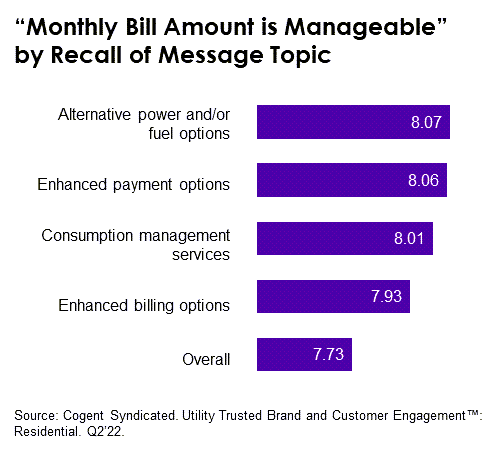
Inflation is back in the news in a big way. The US Bureau of Labor Statistics reports that the June Consumer Price Index increased 9.1% from a year ago, with energy being the largest contributor to overall inflation. Electricity prices have increased 13.7% from 2021, and natural gas has increased a whopping 38.4%.
As a result of these price increases, utilities are starting to see negative consumer perception impacts and are scrambling to respond. While many utilities have responded by pointing out that they pass through fuel costs or by trying to explain the market conditions behind energy price increases, the reality is that the vast majority of customers don’t care why their bill has increased; they just care that it has increased.

One way utilities can provide meaningful help and bolster their relationship with customers is by marketing programs that help customers better manage their bills. While an intuitive “go-to” set of programs is whatever suite of energy-efficiency offerings the utility may have for customers, our Cogent Syndicated data show customers respond most favorably to alternative power and fuel options—things like solar and EV charging. The latter has plenty of ways utility messaging can tap into “savings.”
- Customers who buy EVs are very interested in how electrified powertrains can save them.
- Discussing the significant cost difference between “fueling” their vehicle with electricity versus gasoline can favorably position the utility against high gas prices.
Although alternative power and fuel program messaging has the biggest positive impact on customer views of the affordability of their energy, as the chart shows, any kind of program messaging provides a meaningful lift over the average score. As a result, utilities seeking to combat the negative perception impact of higher energy prices need to put their shoulder behind program messaging. Unfortunately, our Cogent Syndicated data show that just the opposite is happening—while the industry’s Communications Intensity Index is up from pre-pandemic levels, it’s down 11% from its high in the third quarter of 2021, and fewer consumers are recalling program-specific messaging today than they were then.
While managing overall consumer sentiment is complex, utilities that measure and care about customer perceptions aren’t left entirely at the whim of macroeconomic forces. Our data illuminate a path forward to create a new narrative with customers about how their utility is helping them in these uncertain economic times. Please reach out to me if you’re interested in further discussing how to create a communication strategy for inflationary and volatile environments, or if you’d like more information on our forthcoming report on this topic.
Click below to learn more about the report.








